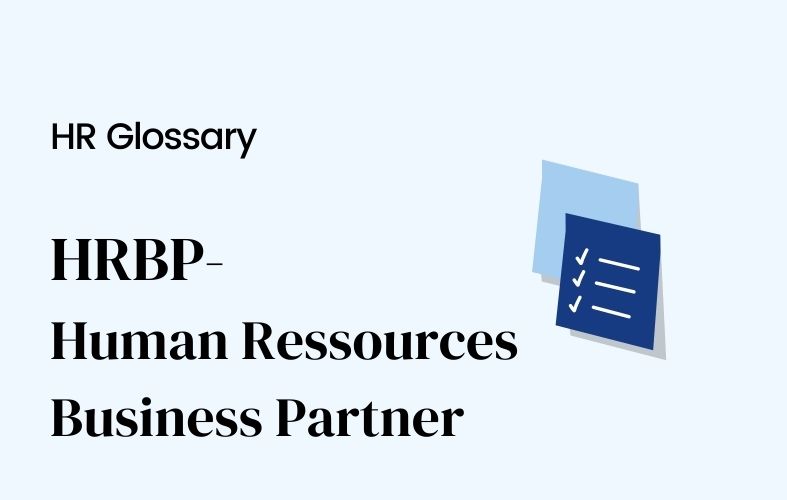HR Business Partner (HRBP)

[Sommaire]
What is an HR Business Partner?
An HR Business Partner (sometimes shortened to HRBP) is a senior HR professional who focuses on the strategic elements of human resource management.
HR Business Partners work closely with people managers and leaders to help them develop their employees to deliver the organization’s objectives.
What does an HR Business Partner do?
When asking ‘what does an HR Business Partner do?’ it is first helpful to know what they do not do. Human resources business partner is not responsible for HR administration or compliance. Their strategic focus means they must engage closely with an organization’s leadership team to ensure that the HR strategy mirrors and supports its wider strategy.
An HR Business Partner role will vary according to the type of business they work in. If working in an SME, the HRBP’s role will be more generalist and focus on day-to-day organizational tasks as well as strategic work.
In comparison, HR Business Partners working in larger organizations will focus on a discrete business area. They will work alongside other specialists and dedicated HR support who deal with day-to-day HR tasks.
Typical tasks for an HR Business Partner position include :
- Supporting the business strategy development and execution with their HR expertise.
- Building relationships across the business to encourage trust and a free flow of information.
- Acting as a key point of contact for managers, employees, and leaders.
- Supporting managers and employees with people-specific issues.
- Guiding and supporting managers and employees during proposed and in-progress restructures and talent planning.
- Investigating the root cause of people and business problems and proposing solutions to help resolve issues.
- Providing coaching and feedback to support business improvements.
What is the difference between an HR Business Partner and an HR manager?
The difference between HR Business Partner and HR Manager can initially feel confusing. Here are some of the key differences:
Involvement in HR administration
An HR Business Partner will typically have very little administrative work to complete. They are usually focused on strategic, ‘bigger picture’ work. In comparison, an HR Manager will carry out a lot of work on HR policies and processes.
What is more, an HR Manager will typically have HR administrators who report to them. In effect, their role is responsible for the organization’s HR administration.
Different internal customers
An HR Business Partner normally works with a distinct business area and ‘partners’ with the individuals in that area to help them deliver their strategic aims through their workforce.
In comparison, an HR Manager works across the organization and is not tied to a particular department or business area.
Focused role vs. broad role
An HR Business Partner is responsible for setting an HR agenda that supports the organization's strategic aims. They are often involved in the training and development of the workforce within their business area and support leaders with change management.
In comparison, an HR Manager has a range of responsibilities, which may include budgeting, recruitment, compliance, and Learning & Development (L&D), as well as setting policies.
How can you shift from HR administrator to HR Business Partner?
Most HR professionals start their careers in the internal human resources department. If you are interested in becoming an HR Business Partner, there are a few key things you can do to make the shift:
1. Get experience in different HR specialties:
The HR department is a broad field, and HR Business Partners must understand all HR specialties well. If you want to move into business leaders role, aim to get experience in as many HR areas as possible. This will give you a well-rounded skill set that will be valuable in a business partner role.
2. Develop your business acumen:
HR Business Partners need to have a good understanding of business. If you want to move into this role, start reading business news and articles. You can also try to get involved in projects outside of HR to gain more exposure to the business side of things.
3. Build your communication and influencing skills:
HR Business Partners need to be excellent communicators. They must be able to build strong relationships with leaders and employees alike. If you want to move into this role, start working on your communication skills. You can do this by taking courses or attending workshops.
4. Build relationships with key stakeholders:
HR Business Partners need to have strong relationships with leaders and employees. If you want to move into this role, start building relationships with key stakeholders. You can do this by attending events and networking within the organization.
5. Get a certification:
While not required, getting certified can make you more attractive to employers. There are a few HR Business Partner certifications available, such as the HR Business Partner Certification from HRCI.
6. Proactively seek out opportunities to add value:
HR Business Partners are expected to add value to the organization. If you want to move into this role, start looking for ways to add value. This could involve taking on additional projects or volunteering for committees.
7. Demonstrate your HR knowledge:
HR Business Partners must have a good understanding of HR. If you want to move into this role, start studying HR and take courses to improve your HR knowledge.
8. Stay up-to-date on HR trends:
HR Business Partners need to be aware of current HR trends. Start reading HR publications and blogs if you want to move into this role. This will help you stay up-to-date on the latest HR trends.
Shifting from HR administrator to HR Business Partner can be a great way to further your career and significantly impact the organization you work for.
By getting experience in different HR specialties, developing your business acumen, and building relationships with key stakeholders, you can position yourself for success.
What are the key skills of a successful HR Business Partner?
There are a few key skills that are essential for HR Business Partners:
1. Communication:
HR Business Partners need to communicate with individuals at all levels of the organization effectively.
2. Business Acumen:
HR Business Partners need to understand the business they are supporting and be able to align HR initiatives with business objectives.
3. Relationship Management:
HR Business Partners need to build and maintain strong relationships with key stakeholders.
4. Influencing:
HR Business Partners need to be able to influence leaders and decision-makers to get buy-in for HR initiatives.
5. Change Management:
HR Business Partners need to be able to manage change initiatives effectively.
HR Business Partners play a vital role in organizations by supporting leaders and employees to deliver business objectives. You may be well-suited for this role if you have strong communication, business acumen, relationship management, and influencing skills.


